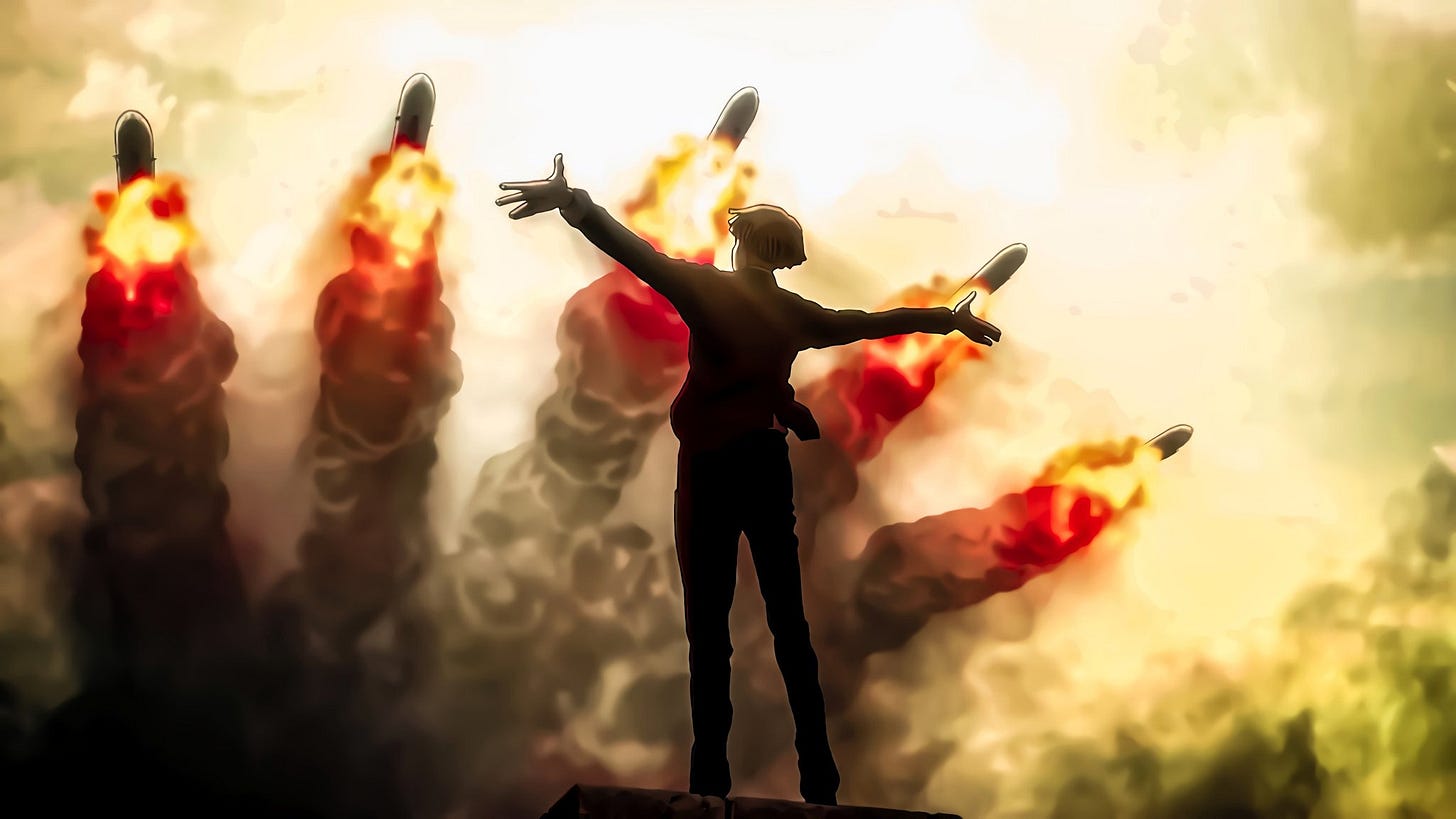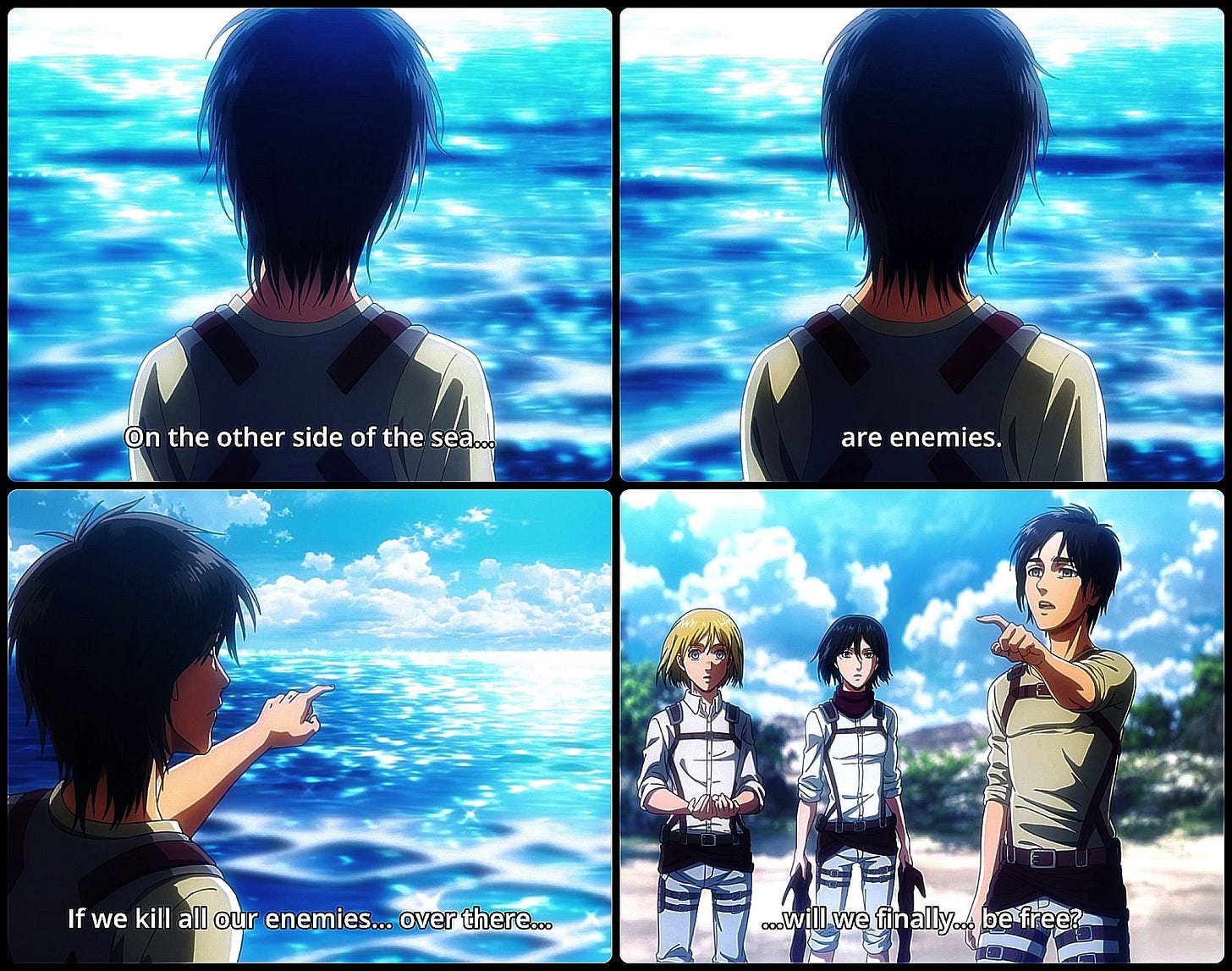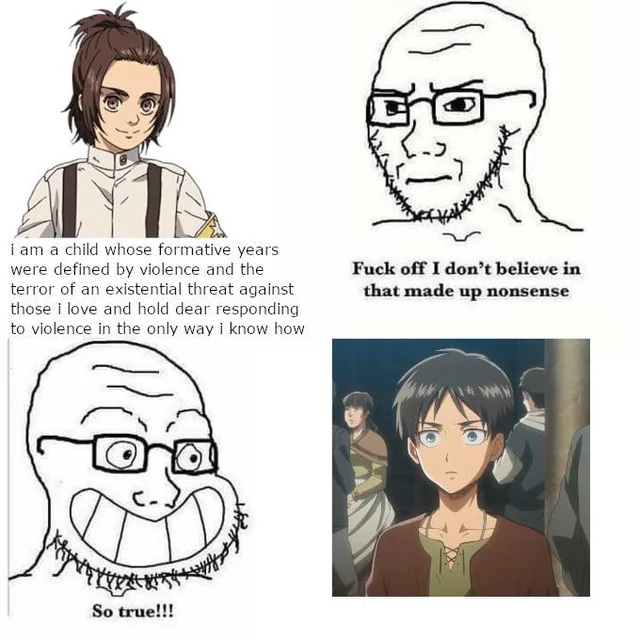Why I don't hate Gabi
Attack on Titan's message against war
Hajime Isayama’s Attack on Titan is a series that many people seriously misunderstand. Some people believe this series to support fascism and imperialism. Some people condemn it for these themes, while others — for reasons I cannot fathom — actively support them. Both these groups are wrong. Attack on Titan’s anti-war messaging is best seen through its most hated character: Gabi Braun.
While I do agree that Gabi is annoying, I don’t get why she is one of the most widely hated anime characters. She does some terrible things, but so does everyone else in AOT. And they don’t get the kind of hate reserved for characters like Griffith and Danzo. In this post, I’m going to explain how Isayama uses Gabi to illustrate his true message, and why so many people misunderstand it.
Note: this post contains spoilers for Hajime Isayama’s manga Attack on Titan
Eren and Eldia
I believe that the first three seasons of AOT are merely backstory — the setting up of plotlines that pay off in the fourth season. We see our protagonists become who they are, and we understand why they believe the things that they do.
We see our protagonist, Eren Yeager, live behind walls surrounded by inhuman monsters. We see his mother get killed and eaten by one such monster. We understand his hatred of the titans, and then we come to understand them too. Then we realize that some titans are humans — that they intentionally killed hundreds of people. We see them as even worse than the animalistic titans — they are humans, in full possession of their mental faculties, with the capacity to know that what they are doing is wrong. They are demons, and we cheer as they are killed.
We see our protagonists with their backs constantly against the walls, fighting against impossible odds, surrounded by people too stupid or too apathetic to help them. We cheer them on, even as they do morally grey things to achieve their goals, because we understand where they’re coming from. We understand Eren’s desire to break free of his chains. We cheer him and his friends on as they join the Survey Corps to fight titans.
"If you win, you live. If you lose, you die. If you don't fight, you can't win!"
— Eren Yeager
The first three seasons perfectly set the stage for Eren’s downward spiral in season 4. We learn that the titans were sent by Marley, an enemy nation from outside the walls. We learn that the idyllic world Eren dreamed of never existed, that the true world hates him and his people. With this reveal, Isayama completely flips the script. The titans, the supposed monsters they had spent the entire series fighting, were human. They had always been human.
Gabi and Marley
Gabi works as a foil to Eren. Just as season 1 gives us Eren’s motivation, season 4 gives us Gabi’s. In truth, they’re the same motivation: to destroy all the supposed ‘monsters’ that took everything from them. But unlike the titans in season 1, we know who these monsters are. They are our heroes.
Like Gabi, Eren — and by extension us — became comfortable with the idea of a group of people being massacred, believing that they deserved neither our thoughts nor our mercy. The supposed inhumanity of the enemy allowed us to validate and rationalize our prejudice. Isayama takes this comfortable world outlook and revisit its through a different perspective to show how dangerous it can be.
Fans of the series hate Gabi because she killed Sasha, a character we loved. Yet from Gabi’s perspective, she killed a monster who was invading her hometown. This dissonance shows the danger of viewing our enemies as monsters. There’s no such thing as a monster. Only humans.
As Gabi begins to question her black-and-white worldview, Eren spirals deeper. The Eren of seasons 1-3 wished to exterminate all the titans in order to protect the people he loved. The people of the walls, Eren included, believed that the titans would be the end of mankind if they were not exterminated. The Eren of season 4 wishes to use the titans to exterminate all of mankind to save the people of the walls. Eren and Gabi having the exact same motivation, conveyed through the exact same language just with different targets, highlights how dangerous this thinking was all along.
A message against war
The same happens in the series with the concept of war. The first few seasons make us smile as we watch these characters volunteer and train to become scouts they pledge their lives to the military. They receive praise and adulation from both we the viewers and the people in the fiction. We admire them for risking everything that they are in combat because it shows their dedication to their country and their cause. Season 4 turns this on its head. the Marleyans do the exact same thing as the Eldians — turn children into killers. But without the romanticization, we see how conceptually inhuman this is.
Why in the world were we excited to see kids fight monsters? Why were we cheering teenagers risking their lives? There should be no pride in being a killer. War should never excite us, because those that fight it are not those that declare it. War will inevitably spill over to irrevocably harm those that never volunteered to be touched by it. For the longest time Attack on Titan was framed as this one-sided battle against unknowable evil, and we as viewers became complacent with the horrific measures drawn to combat that evil. Season 4 showed us that as soon as we start to learn of our enemy things become a lot more gray.
People say AOT has undertones of Nazi and Fascist ideology, especially with the Yeagerists. And while I agree to some extent, I don’t think Isayama ever intended to portray the Yeagerists as the good guys. I genuinely don’t understand why people actually support Eren and the Rumbling. Yes, Marley was going to attack Eldia, but there were very obviously better ways to prevent that than killing 80% of the world’s population.
Eren believed that the war on Eldia would end if he got rid of the titan powers, and the people he loved would be safe. What he didn’t understand is that his own followers would never let the war end. Fundamentally, fascism needs something to fight in order to keep itself going. If Eren really had wiped out everyone outside the walls, the Yeagerists would just have turned on each other.
Conclusion
Those who hate Gabi fundamentally misunderstand Attack on Titan. Yes, she has moments that come off as unhinged or psychotic, but she’s twelve. A child soldier who grew up in a concentration camp, and has spent her entire life being brainwashed into hating herself and her people. I find it surprising how little empathy fans have for her, especially since her story is nearly identical to Eren’s. And unlike Eren, who spiraled deeper into his warlike mentality until he committed genocide, she took active steps to grow and become a better person. Sure, she did some terrible things, but who in the series hasn’t? She gets more hate than the empire that made her the way that she was. Gabi is Isayama saying that people can change, and that hatred can be overcome. She isn’t my favorite character by any means, but she definitely doesn’t deserve the hate.





Awesome analysis!! I watched AOT a few years ago, and in all honesty, I don't remember ever finishing it, despite getting halfway through the fourth season. Yet, this conversation reminded me of the debate of whether war films could ever truly be anti-war; the act of making a movie or show about a certain subject requires making said subject have entertainment value. What does it say about storytellers who seek to make a spectacle out of unadulterated horrors? It makes me question if AOT truly achieved its intent to speak on the senselessness of war, and the pacing issues (that many people have pointed out before) potentially contribute to its shortcomings. After spending three whole seasons drawing out incredibly exhilarating fight scenes and justifying the main character's ultimate resolve, can all that really be effectively subverted in a single season and two movies?
Every so often, I come across an AOT video using the audio of Erwin's speech. And while it sounds super badass, you can't ignore the fact that the speech was meant to motivate soldiers to rush into a final, likely suicidal attack. It reminds me of Wilfred Owen's poem, Dulce Et Decorum Est:
"My friend, you would not tell with such high zest / To children ardent for some desperate glory / The old lie: sweet and fitting it is / to die for one's country."
Correct me if I'm misinterpreting this moment, or forgetting elements of the show that would prove me wrong, but it feels like the spectacle baked into AOT--the beautifully animated fight scenes and invigorating speeches--ultimately deviates from the show's anti-war messaging. You raise a lot of important questions, like why *do* we get excited to see children face off against monsters, risking their lives in the process? I would also raise the question: does the show's willingness to make the fight scenes and speeches so cool ultimately bolster common misinterpretations? In other words, is the show responsible for these misinterpretations, especially if the misinterpretations are so widespread? If so, should that be taken into account when ultimately evaluating the show's quality?
I tend to have problems with pieces of media that fail to account for its implications, one being Anora, a movie which I don't believe effectively subverted its love story at all. That said, I should definitely rewatch/finish AOT before coming to a conclusion haha.
This is one of those things where it's like, is it just that people hate women? Or is it that 'annoying' is a greater sin than being evil for viewers? It's hard to say. To be fair, I have the impression that a lot of people dislike Eren as well.